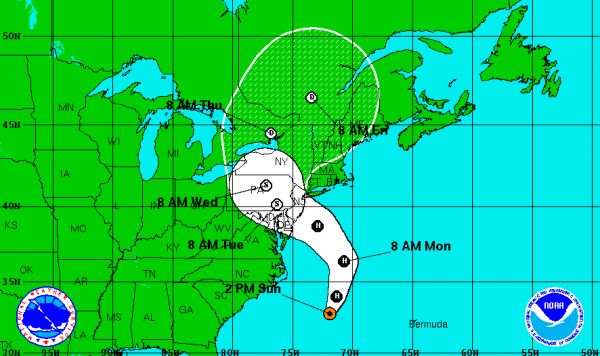
In the old days people worried less about storm preparations because they generally didn’t know what was coming and had no electricity anyway. How times have changed. These days we have the advantage of things like The Weather Channel and weather.com warn us, or perhaps scare us with sensationalistic reporting. We also have a power grid we rely on for everyday life and computers and mobile devices that keep us connected. So, what do you do when all of this technology suddenly fails, as it is likely to do in the coming hours and days for people in the mid-Atlantic region?
The easy answer is to buy a generator, but those aren’t cheap and, if you live in the path of oncoming Hurricane Sandy, as I do, you will find that stores are already sold out of generators, not to mention batteries, flashlights, milk, eggs and bottled water. However, there are other, cheaper solutions.
Car charger. One thing your local Wal-Mart or Best Buy shouldn’t be sold out of is a simple car charger for your cell phone or tablet. You can get one even cheaper online, but if you have waited until now then you will have to settle for paying the small premium of the big box stores. These devices simply plug into a cigarette lighter or 12 volt outlet in the car. Cigarette lighters tend to only work when your vehicle’s engine is running, while dedicated 12 volt outlets work all the time. Make sure you fill up your tank before the storm if you will have to run the engine to charge.
Solar charger. Sure, you may not get any sunlight during the storm, but the power could potentially be out for days after. And, if those are sunny days then this could be a great, inexpensive solution. Set it outside or in a window sill, plug in your device and charge away. It’s slow, but does work.
Battery packs. They are portable wireless charging devices that can generally be found for anywhere from $20 to $80. Again, you can get a better deal online, but if you are in a pinch then you can grab one from a brick and mortar computer retailer. Make sure you plug in and fully charge it while you have the chance. You can then plug your device into it for later charging.
Mobile WiFi hotspots. All of the major US cellular carriers offer these little devices. Head to a mobile store of your choice to grab something like the Verizon MiFi or Jetpack 4G. A word of caution: these come with a monthly service plan and, in most cases, a two year contract. If you can live with that then it’s a great solution to have Internet everywhere, even when you don’t have power.
Extra batteries. While you are thinking of those C and D batteries to power your flashlight, you may also want to consider extra batteries for your smartphone and laptop. Make sure you charge them up before you set them aside.
Apps. There are some mobile apps that can prove quite helpful in a situation such as the impending hurricane may present. One is a simple flashlight app for your smartphone. If you are on Android then I prefer Tiny Flashlight, but there are countless free ones on all of the major mobile platforms. You may also want to grab a weather app and, again, there are plenty of capable free ones out there.
Finally, I would suggest getting a radio app such as IHeartRadio or TuneIn Radio. Both are free and are great for listening to all sorts of music, but you can also tune in to news stations and weather reports. There are also apps that can turn your smartphone into a mobile WiFi hotspot, allowing you to power your laptop off of the phone’s 3G or 4G connection. Use caution here because some carriers will add an extra charge if they find you are doing this.
Conclusion
These are just a few suggestions to keep you connected and safe during a bad situation. If you have others then please chime in with a comment. If you are sitting in the path of Sandy then prepare and stay safe.

